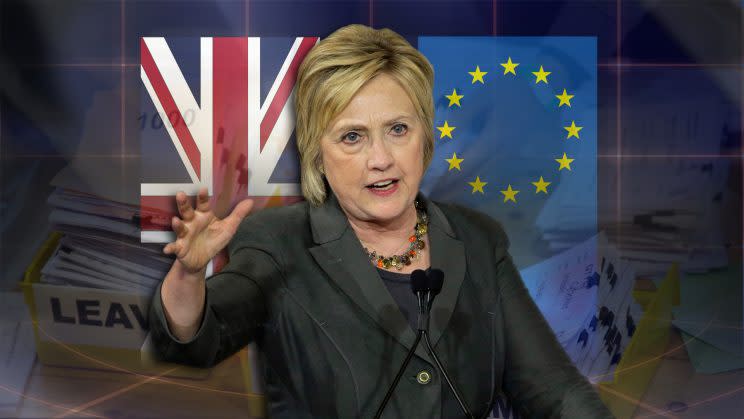Brexit vote a warning to Clinton campaign
The United Kingdom’s stunning decision Thursday to leave the European Union offers stark lessons to Hillary Clinton’s campaign, which has struggled to combat Donald Trump’s populist and nationalistic appeal to voters in this country.
The Brexit vote became a referendum on immigration and the political establishment in the U.K., two lightning rods that are also dominating the presidential race in this country.
Trump celebrated the vote Friday, saying it was “a great thing” and would bring more visitors to his Scottish golf course because the pound would lose value. He lauded the Brits, fueled by anger over immigration, for taking “their country back.”
Trump isn’t the only one who thinks the social and economic forces behind the Brexit vote are also stoking populist anger in the United States.
“For Hillary Clinton’s campaign, this is something of a warning not to underestimate this disaffection, not to underestimate political and economic nationalism,” Richard Haas, the president of the Council on Foreign Relations, told reporters Friday.
Clinton leads Trump on average in national polls by about six percentage points, and her campaign has tens of millions more dollars cash on hand and hundreds more staffers than his. But if the Brexit decision slows growth in the United States or causes more economic turmoil here, it’s possible that an economic recession could fuel voter discontent further, changing the dynamics of the race. Americans could seek to kick out Democrats and elect Trump as a reaction to the sluggish growth, even though Trump backed the U.K.’s decision to leave. On Friday, the vote sent shock waves through the British and global stock markets, and the value of the pound plunged.
But Clinton’s top advisers insisted Friday that Brexit would help her campaign, as voters would seek an experienced political leader in the face of economic turmoil.
Jen Palmieri, Clinton’s top spokeswoman, said people will be looking for certainty in times of global economic upheaval. “The lesson out of all of this is that we need someone like Hillary Clinton in the Oval Office, not someone erratic and divisive like Donald Trump,” Clinton senior adviser Jake Sullivan told reporters. Sullivan said Trump was a “reckless egomaniac” with a “pathological” need to congratulate himself after world crises, and that voters would reject him even more in times of crisis.
But Sullivan also dismissed the idea that the Brexit vote can be compared to the U.S. presidential election.
“It is really important to recognize that a vote on whether the U.K. stays in or leaves the E.U. is profoundly different from a vote on who should be commander in chief of the United States,” Sullivan said. “There are a variety of factors that went into this vote in the U.K. and obviously a sense of deep frustration and alienation among the voters was one of them, but there are other factors as well. Hillary Clinton is not focused on what is happening in the U.K., but on what is happening in the United States.”
But there are clearly lessons for Clinton to learn from British Prime Minister David Cameron, who repeatedly used the phrase “stronger together,” a Clinton campaign slogan, while unsuccessfully stumping for Brits to vote to remain in the E.U.
The “Remain” campaign was criticized for attempting to rally people to their side solely by scaring them about the horrors of leaving. “[The Remain campaign] seemed to consist largely of pocketbook warnings that people would be worse off outside the Europe Union,” wrote one journalist. “It was not inspirational. It failed.”

That sounds similar to criticisms Sen. Bernie Sanders has made of Clinton’s campaign. “We have got to work tirelessly to make sure that Trump is not president — but that is not good enough,” Sanders said in New York Thursday night, arguing that Democrats must put forward a progressive vision that’s more than just anti-Trump.
The Clinton campaign is aware that they need to balance a strategy of defining Trump negatively and delegitimizing him as a plausible candidate with one of motivating people to vote for Clinton, according to an aide. That’s why they spent millions of dollars last week to air ads touting Clinton’s past helping children and disadvantaged people early in her career, even as she’s begun giving regular speeches deconstructing Trump’s policy statements and painting him as dangerous and reckless.
The vote also carries lessons on how emotional and motivational the topic of immigration can be. Clinton and Trump could not be further apart on the issue. Trump wants to deport all 11 million undocumented immigrants in this country and then to build a border wall that he will convince Mexico to pay for. Trump’s also proposed temporarily banning all immigration from Muslim countries. Clinton has said she believes only immigrants who commit crimes should be deported, and that she will begin trying to pass comprehensive immigration reform with a path to citizenship in her first 100 days in office.
Sullivan said Clinton does not believe the American people are isolationist, and strongly believes Americans will reject ideas like building walls and banning millions of immigrants from coming to the country. “Nothing about what happened in the last 24 hours has changed her view on that,” Sullivan said.
Still, Brexit suggests that Clinton will need to inspire voters about her vision of an inclusive America.
“I think she has to and she will set forth a positive vision and explain why immigration has been so important,” said Richard Socarides, a Clinton supporter and former adviser to President Bill Clinton. “I think she will argue forcefully about how the values that our country symbolize are ones that make us welcoming.”


